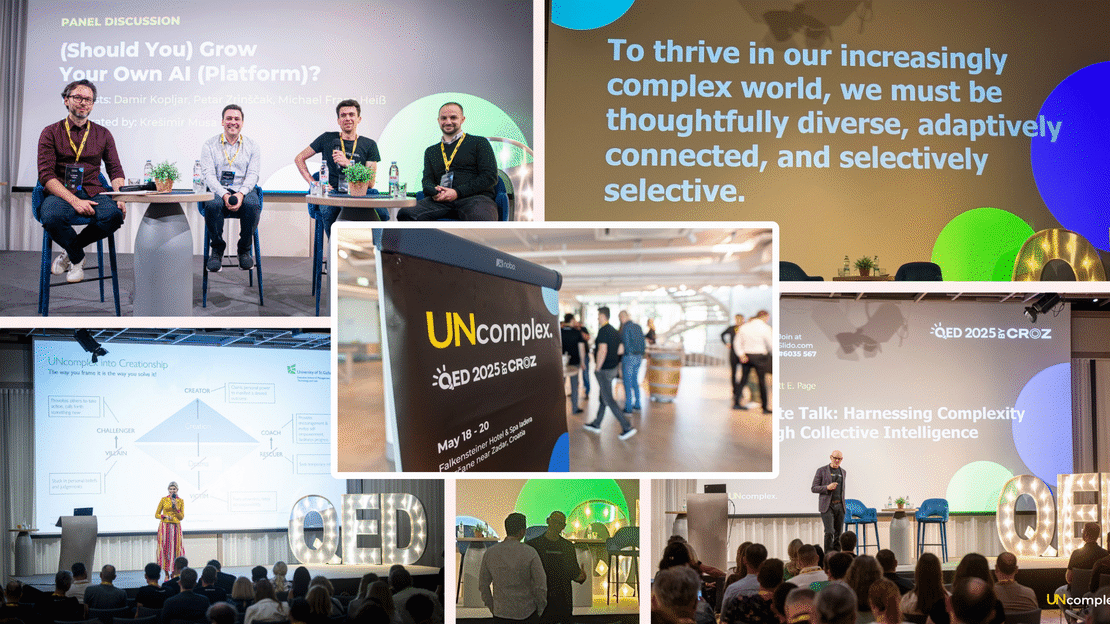
QED Conference 2025 - UNcomplexing efforts in Enterprise Development
Table of Contents
I was honored to be invited back as a speaker and panelist at this year’s QED Conference – Quality in Enterprise Development 2025, hosted by the innovative Croatian BizTech company CROZ.
QED isn’t just another tech conference — it’s a gathering of forward-thinking leaders who are actively shaping the future of the digital business models of their enterprises. The event stands out for its focus on real-world experience, open exchange, and practical strategies for thriving in an increasingly complex world.
For me personally, it was a privilege to contribute again to this exceptional event and to connect with so many insightful professionals, thought leaders, and friends in the community.
My Personal Highlights of QED2025
Before diving into my own contributions, a few moments from the main stage deserve special mention—both for their impact and for setting the tone of the entire conference.
BizTech Conversations That Mattered
QED is a biztech conference in the best sense of the word. I had the opportunity to engage in thoughtful discussions with business leaders, authors, people in charge of large engineering transformations and fellow speakers. Most discussions were about what it truly means to build sociotechnical organizations. Our conversations touched many aspects that affect flow and complexity like platform strategy, AI usage, Governance Engineering, Organizational Learning, Organizational-Psychology and in general the importance of enabling autonomy without losing alignment. We all seemed to agree:
- We must actively look for ways to deal with increasing complexity by acting smart.
- Siloed thinking is one of the worst enemies when trying to “uncomplex” things. Gaining a Systemic Perspective isn’t optional any more — it’s essential.
- Shortcuts in engineering in favor of roadmap promises always turn out to lead to unsustainable activities.
- Supplier strategies need to be rethought (BizTech mindset rather than Transactional Body-Leasing) to mitigate risks coming from increasing complexity of digital value chains and ecosystems.
- AI is already changing how we manage change in our organizations.
- Platforming urgent/important topics (Governance, Risk, Compliance) will be a mandatory task.
Dr. Stephanie Schoss – ‘Fly High – Love Deep & Enjoy the Ride’
Dr. Stephanie Schoss (Director at the HSG Executive School of Management, entrepreneur, pilot, and mother of a large family) delivered a powerful keynote on the art of simplicity in a complex world. It wasn’t just inspirational—it was practical.
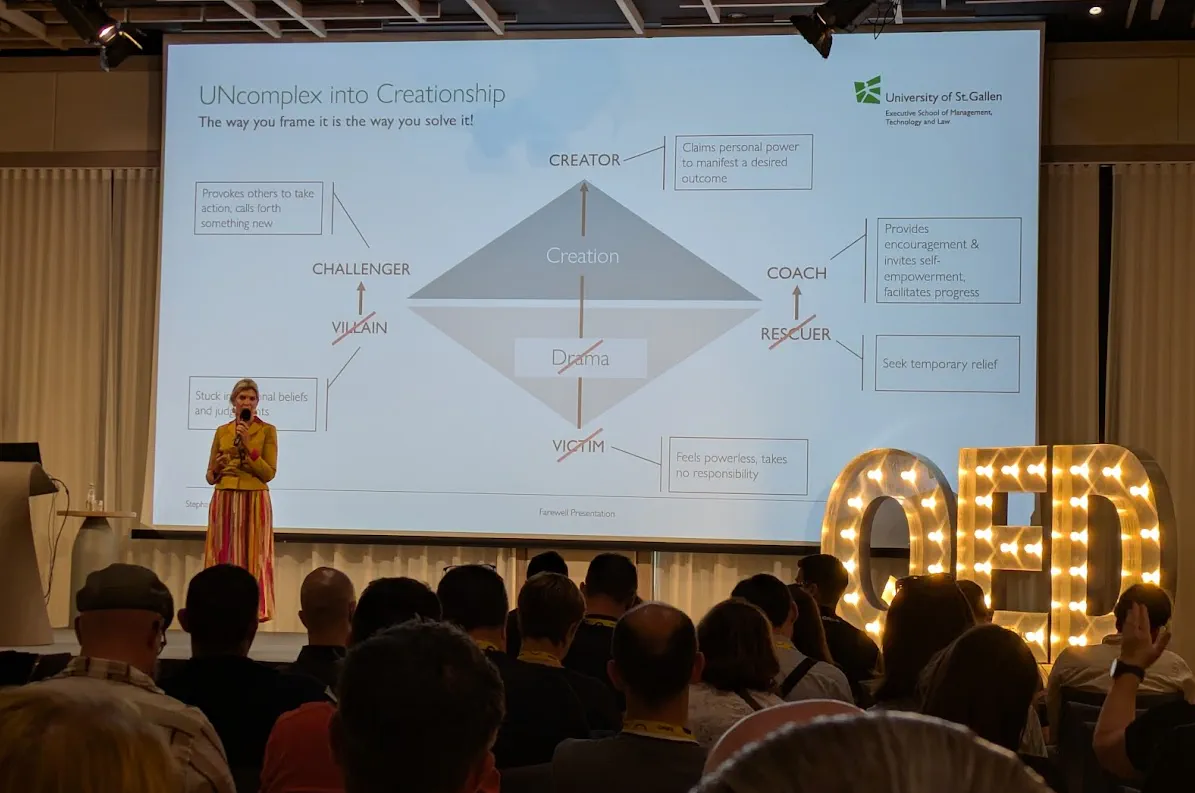
My Key Takeaways:
- My personal North Star in business is rooted in family and relationships - not technology, success, or money. I was genuinely surprised (and encouraged) to see that live surveys showed nearly every attendee felt the same way.
- The importance of situational awareness and having a clear personal vision
- Building your own checklist for chaotic or high-stakes situations
- Escaping drama triangles without help by switching perspectives
- Structuring work and life based on importance and urgency, not just effort
Prof. Dr. Scott Page – Harnessing Complexity Through Collective Intelligence
Prof. Page, a distinguished professor of complexity and social science, delivered a keynote packed with insight and backed by data. He explored the fascinating paradox at the heart of complex adaptive systems: while they are remarkably robust—able to maintain functionality despite external shocks, environmental shifts, and the entry or exit of key actors—their rare failures can be catastrophic in scale.
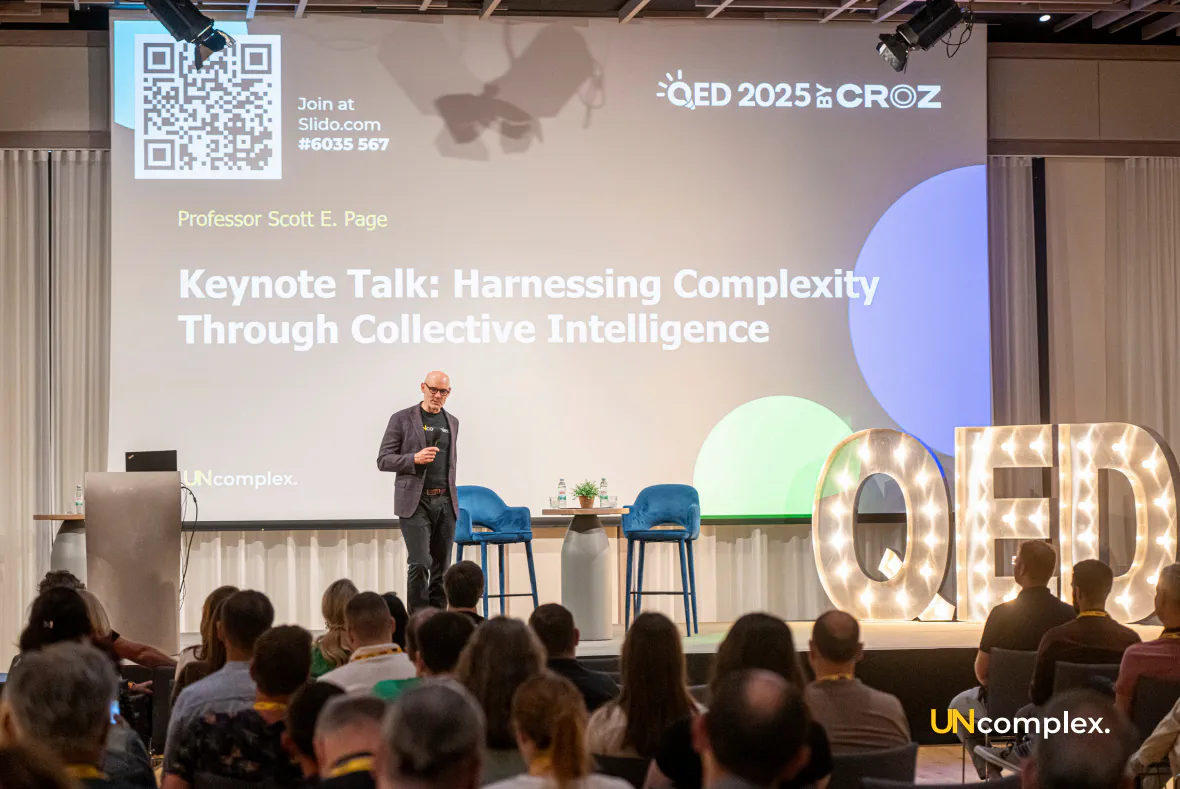
He connected this to the current era, where advances in AI and digital technology are driving ever-increasing complexity, uncertainty, ambiguity, and volatility. In this context, Prof. Page challenged us to consider: How can organizations build the collective intelligence needed to harness complexity—enabling innovation, growth, and even enjoyment in “interesting times”—while also avoiding the risk of large-scale failures?
His answer centered on the power of diversity of thought. By intentionally cultivating heterogeneous perspectives and structuring organizations to benefit from them, we can consistently achieve better decision-making in complex environments. Prof. Page showed research about how collective intelligence is not just a buzzword, but a practical necessity for navigating ambiguity and thriving in a world where the only constant is change.
My Talks and Panels at QED2025
Panel: (Should You) Grow Your Own AI (Platform)?
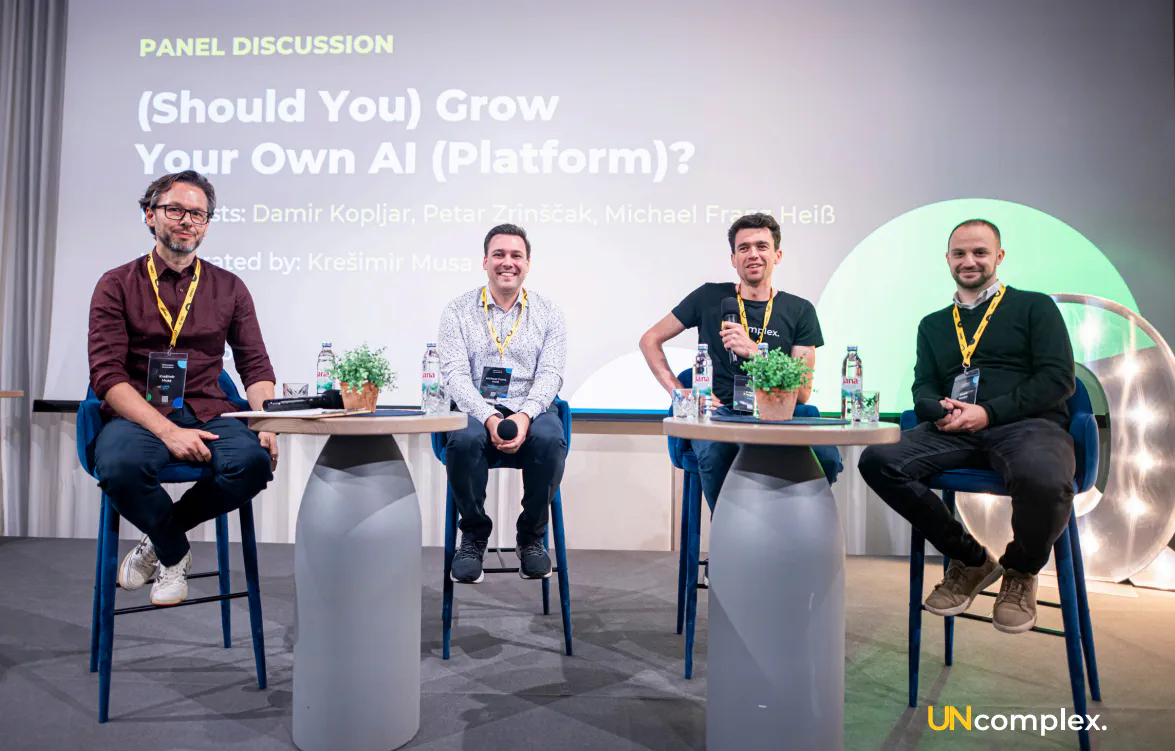 The panel, titled “(Should You) Grow Your Own AI (Platform)?”, explored a key dilemma many organizations face today. Together, we unpacked What an AI platform actually is, why companies are tempted to create one, and what’s truly involved — beyond the hype.
The panel, titled “(Should You) Grow Your Own AI (Platform)?”, explored a key dilemma many organizations face today. Together, we unpacked What an AI platform actually is, why companies are tempted to create one, and what’s truly involved — beyond the hype.
I had the privilege of joining a panel discussion alongside an exceptional group of experts: Krešimir Musa (CTO at CROZ), Petar Zrinščak (CEO at Riware Development), Damir Kopljar (Head of AI at CROZ AI)
From infrastructure and governance to ownership and strategic alignment, we tackled both the promise and the challenges. It was demonstrated that building your own AI platform can be done with cost efficiency in mind while the real benefit of platforming AI lies in balancing speed (rapidly creating product capabilities and internal subject-matter-expert tools) and quality (governance, risk, compliance and protection of data-based intellectual property).
Talk: API Platform as a Community Garden
In another session, I co-presented with Dr. Adrian Andronache, Head of Platform and Frameworks for Ecosystem at DATEV eG. Our talk, “API Platform as a Community Garden: How to Grow a Thriving API Ecosystem,” used simple metaphors from a mutual hobby to illustrate what a good platform should look like.
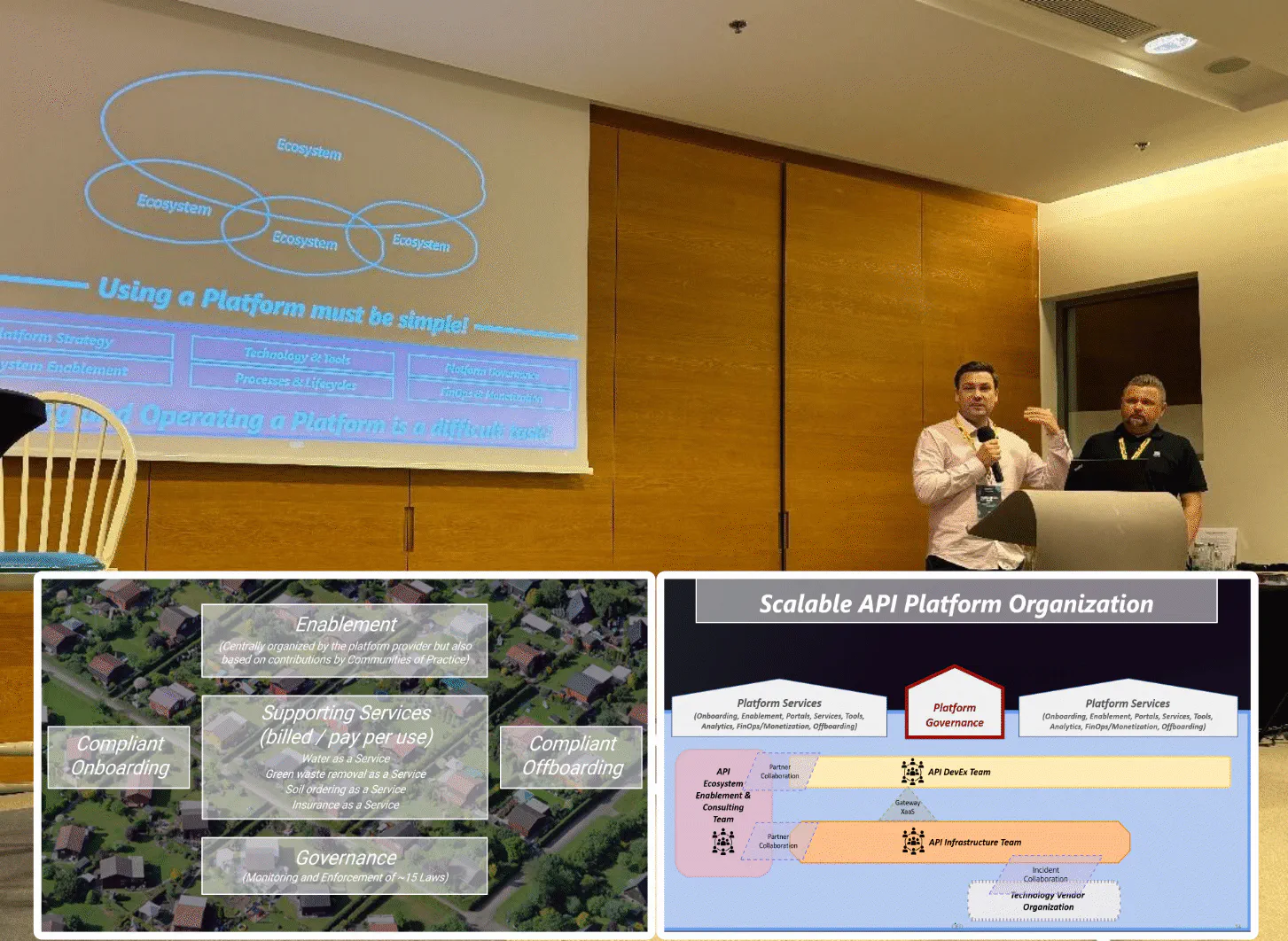
We compared digital platform ecosystems to community garden clubs in Germany: both are shared spaces that only thrive when structure, collaboration, and autonomy are in balance. We explored:
- How to simplify platforms for overloaded users (“A Platform Must Be Simple”)
- Essential platform features: Compliant Onboarding, Enablement, Pay-as-you-go, Analytics, Monetization/FinOps, Offboarding, and the right Governance to protect the environment
- Why well-maintained paths (Paved/Golden Roads) matter more than controlling every detail
- Lessons from DATEV’s five-year API platform journey—balancing complexity and community needs
- The sociotechnical challenges of working with vendors
- How AI assistants can streamline governance, enablement, documentation, and design—without scaling internal experts
Final Thoughts
QED 2025 reminded me once again why quality in enterprise development is about far more than tooling, agile checklists, or DevOps rituals. It’s about clarity, collaboration, and coherence across people, systems, and technology.
A heartfelt thank you to CROZ for the invitation, the platform, and the exceptional curation of content and setting the stage for a meaningful networking community.
I’m already looking forward to QED 2026.